-
Posts
15,146 -
Joined
-
Last visited
Content Type
Profiles
Forums
Store
Help Articles
Posts posted by liuzhou
-
-
If anyone finds themselves in Nanning and wants to try - here are the addresses (in Chinese) of six of the branches. The seventh is the newest and not on their advertising yet.
-
I just bought a big bag of them a few days ago!

-
Beef and cumin is available pretty much all over China. Just as Sichuan food is available all over China, it has spread.
There are a couple more Sichuan recipes from Fuchsia here.
-
The Lee Kum Lee brand is certainly available in the US. It is also the easiest to find in China.
Facing Heaven Chillis were available in the UK via mail order until recently. I have no idea why it stopped.
By the way: Don't do what a friend did and order both "Land of Plenty" and "Sichuan Cookery". They are the same!
For some unknown reason the American publisher renamed it. It is essentially the same book. Even Amazon got confused for a while and was offering the two together at some sort of discount.
Her next book, Revolutionary Cooking is equally good.
-
Seafood, too. (shrimp, scallops, etc.)
Remember that Sichuan is landlocked and far from any seas, so seafood, although available, is not so common. Most fish are fresh water varieties.
Get the Fuchsia Dunlop book.
(BTW. The "Beef with cumin" recipe is not from Sichuan. She does write about other areas.
 )
) -
Slight correction (Too late to edit)
The Lemon Duck was ¥20 per jin (500 grammes). Still very reasonable.
-
At the weekend, I finally set off in search of the fabled Nanning preserved lemon duck. Cunningly, I went to Nanning where I called my aforementioned Zhuang friend who called an ex-high school classmate whose grandfather happened to be the founder of Nanning's first preserved lemon duck restaurant.
Well, he didn't found a preserved lemon duck restaurant, but he did open a hole in the wall, two table restaurant. Later, his daughter, introduced lemon duck to the menu and the place really took off. Today, they have seven outlets throughout Nanning and they ain't hole in the wall. This is the one I ate at.
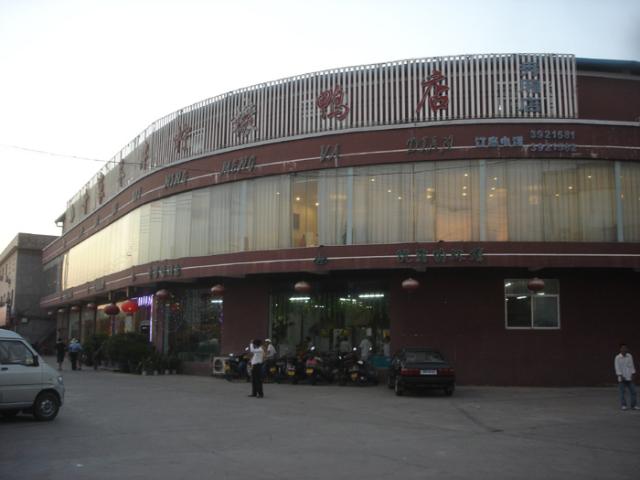
We were ushered into this elegantly decorated private room and were served tea as we waited for our guests.
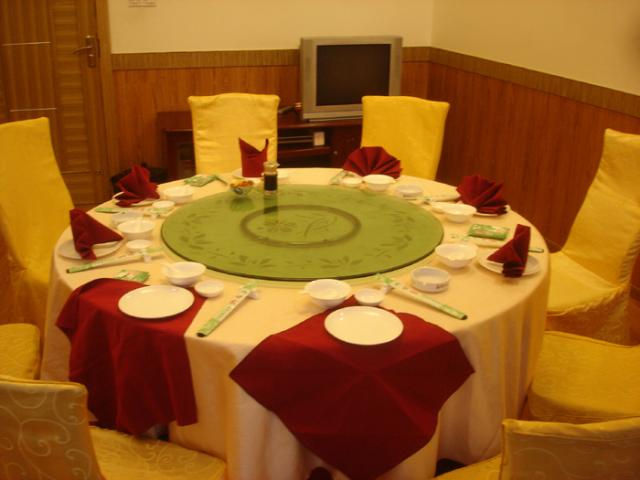
Finally, we ordered food for five people (including grandson) and were served:
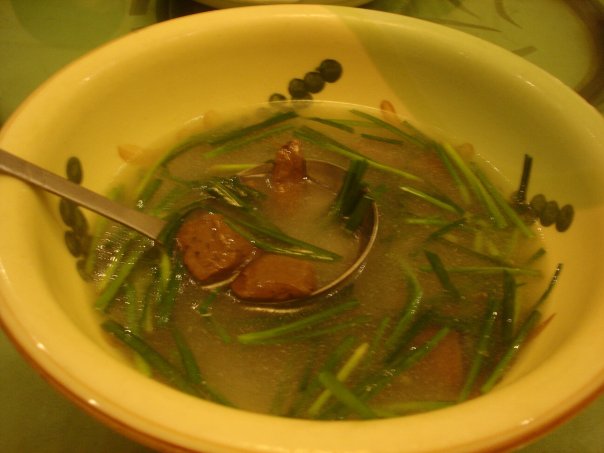
Duck's Blood and Chinese Chive Soup
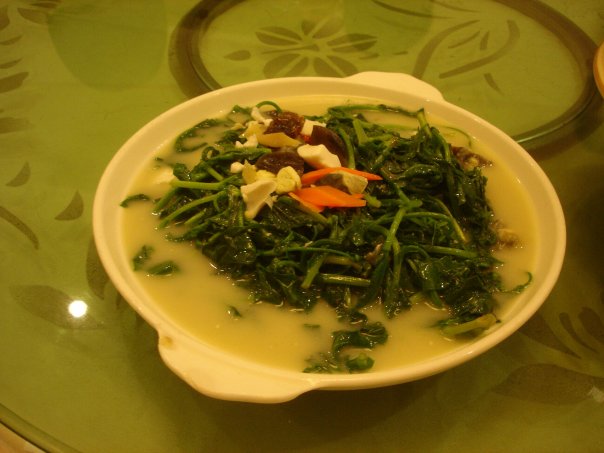
This was described on the menu as "A Little Red". It is mixed "wild" vegetables with preserved eggs. I'm told the "wild" vegetable is grown in greenhouses.
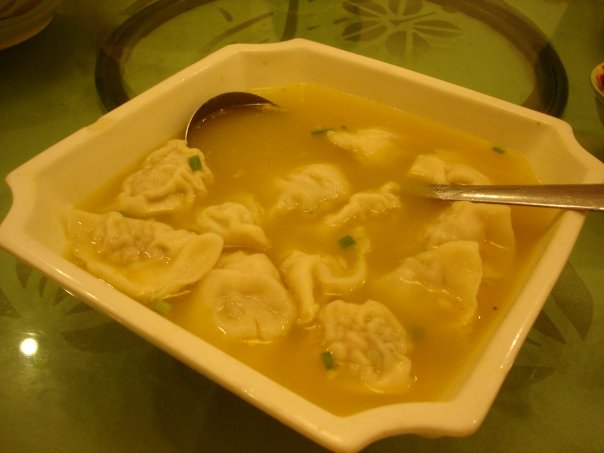
Shui Jiao. (Dumplings in Soup)
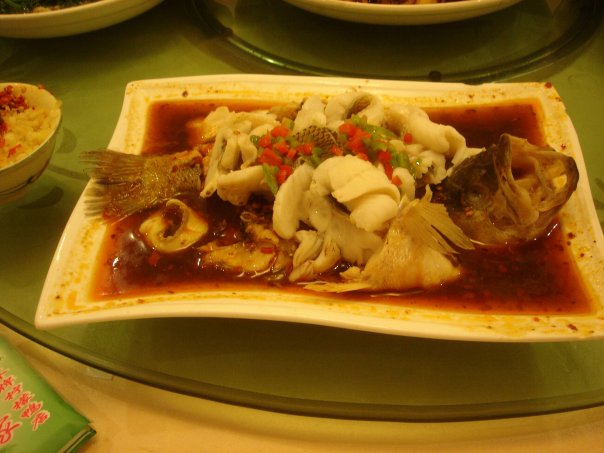
"Old Mother's Fish" (Steamed Bass)

Papaya and Red Clams
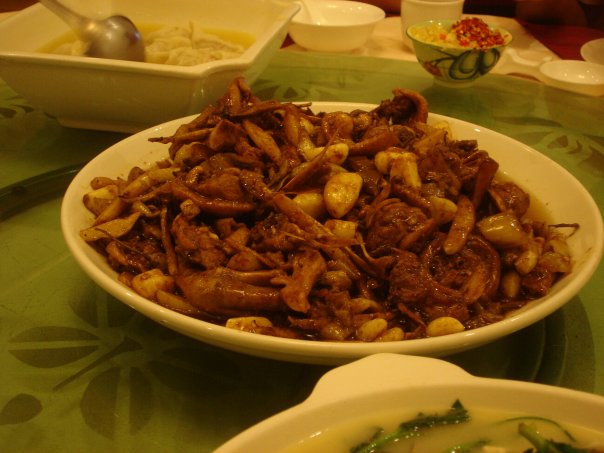
And, of course, the star of the show - Preserved Lemon Duck.
Everything was excellent, but it's the duck I came for. It was sensational. They offered a choice of three different breeds of duck, but grandson recommended the cheapest - Pekin Duck - the same beast traditionally used for Peking Duck.
The dish is duck, infused with the scent and flavor of lemon, but a deep rich flavor. The lemon is so obvious but never overwhelmed the duckiness. Apart from the duck and preserved lemons, identifiable ingredients were ginger and whole garlic cloves.
So it was time to interrogate grandson (who admitted that he had eaten this dish almost every day of his 24 years and never tires of it.) How to make it!
He carefully explained the process.
Take a duck. Stuff it with the ingredients.
"What ingredients?"
The ingredients for the duck.
Then roast the duck with the ingredients. There are many ingredients.
Cook the preserved lemons separately with the ingredients for preserved lemons.
Chop the duck into small pieces and add the lemon at the last minute.
Serve.
Ingredients?
Yes, many ingredients.
I was clearly getting nowhere!
He did later point out that it is difficult for them to expand much more as there is a shortage of "ingredients" and that it takes an absolute minimum of three months to make the preserved lemons.
I understand their reluctance to give away their "secret" to passing foreigners (or anyone else.) They are not the only lemon duck restaurant in Nanning, but the were the originals and are regarded still as the best. I will be back.
P.S. When we asked for the bill, we were told it had been "lost". Grandson had cancelled it!
From memory the duck was ¥20 (about $3 US, £1.60, €2). Other dishes were. around the ¥18-25 mark. Very reasonable.
-
 3
3
-
-
You mean this?
![z_chinese_pot_large_MED[1].jpg](http://dmreed.com/images/z_chinese_pot_large_MED%5B1%5D.jpg)
-
I just got back from a big Mid Autumn family dinner - 30 people over two tables. Around 20 dishes. Great food.
Towards the end we were offered mooncakes cut into quarters. Every single person said "No. Hate the things!"
-
Sorry bobmac, I only know where to get them in the UK. Or I thought I did. The two places that did them mail order seem to have disappeared!
Luckily for me, I'm in China!
(Spots opportunity to fill gap in market!)
-
Where are you, bobmac?
-
The Chinese do not have a specific word for umami
My dictionary and my friends agree on 鲜味 (鮮味 in traditional)
-
I'll email Fuschia and tell her about your posting.
She also posts here under the name 'fiore'
-
Traditionally wok-cooking needs a wok burner
I've never seen one in any Chinese home.
Lots of Chinese people use skillets at home.Never seen it. And the local kitchen supplies shops don't have them.
-
Any idea why they're so brown?
Nope. But I think if you stick most things in salt and sun for eleven years ...
Have you never seen an Australian surfer?

-
 1
1
-
 1
1
-
-
I've eaten one in the relish described. I'm now trying to extract the "secret" recipe for the Lemon Duck from my Zhuang friend's grandmother. Sweet-talking her failed. Bribes failed. Guess we're going to have to torture her.

I will post it if I ever get it.
-
A few days ago, I was given a lovely gift. A big jar of preserved lemons.
I know Moroccan preserved lemons, but had never met Chinese ones. In fact, apart from in the south, in many parts of China it isn't that easy to find lemons, at all.
These are apparently a speciality of the southern Zhuang minority of Wuming County near Nanning. The Zhuang people are the largest ethnic minority in China and most live in Guangxi. These preserved lemons feature in their diet and are usually eaten with congee (rice porridge). Lemon Duck is a local speciality and they are also served with fish. They can be served as a relish, too. They are related to the Vietnamese Chanh muối.
I'm told that these particular lemons have been soaking in salt and lemon juice for eleven years!
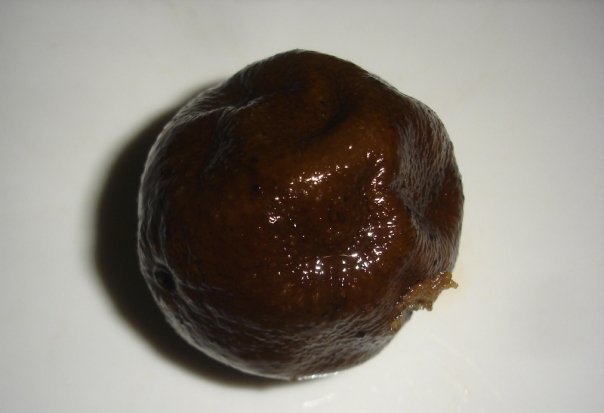
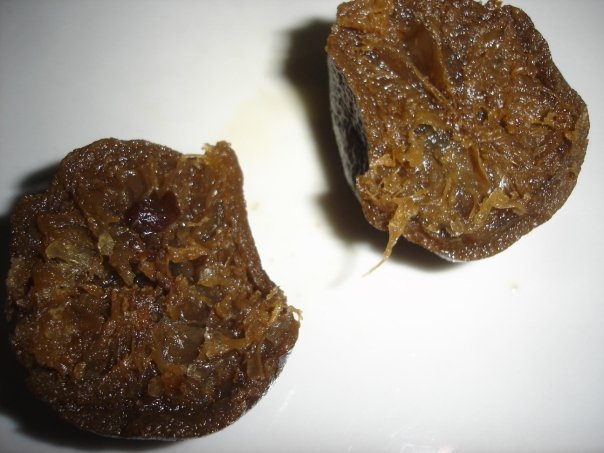
So, of course, you want to know what they taste like. Incredibly lemony. Concentrated lemonness. Sour, but not unpleasantly so. Also a sort of smoky flavour.
The following was provided by my dear friend 马芬洲 (Ma Fen Zhou) who is herself Zhuang. It is posted with her permission.
How to Make Zhuang Preserved Lemons
By 马芬洲
Zhuang preserved lemons is a kind of common food for the southern Zhuang ethnic minority who live around Nanning Prefecture of Guangxi Zhuang Autonomous Region in China. The Zhuang people like to make it as a relish for eating with congee or congee with corn powder. This relish is a mixture of chopped preserved lemons, red chilli and garlic or ginger slice in soy sauce and peanut oil or sesame oil.
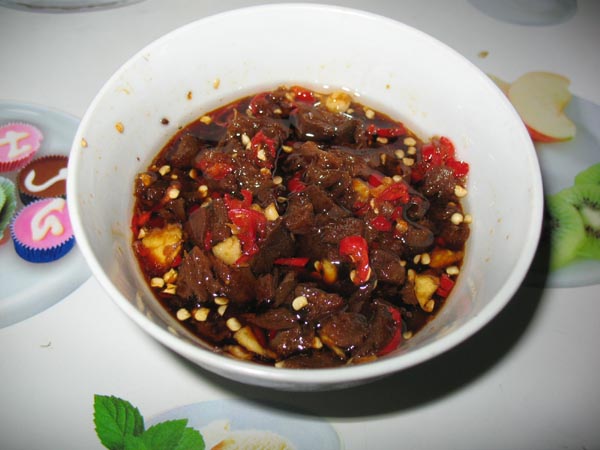
Sometimes the Zhuang people use preserved lemons as an ingredient in cooking. The most famous Zhuang food in Guangxi is Lemon Duck, which is a common home cooked dish in Wuming County, which belongs to Nanning Prefecture.
The following steps show you how to make Zhuang preserved lemons.
Step 1 Shopping
Buy some green lemons.
Step 2 Cleaning
Wash green lemons.
Step 3 Sunning
Leave green lemons under the sunshine till it gets dry.
Step 4 Salting
If you salt 5kg green lemons, mix 0.25kg salt with green lemons. Keep the salted green lemons in a transparent jar. The jar must be well sealed. Leave the jar under the sunshine till the salted green lemons turn yellow. For example, leave it on the balcony. Maybe it will take months to wait for those salted green lemons to turn yellow. Later, get the jar of salted yellow lemons back. Unseal the jar. Then cover 1kg salt over the salted yellow lemons. Seal well the jar again.
Step 5 Preserving
Keep the sealed jar of salted yellow lemons at least 3 years. And the colour of salted yellow lemons will turn brown day by day. It can be dark brown later. The longer you keep preserved lemons, the better taste it is. If you eat it earlier than 2 years, it will taste bitter. After 3 years, it can be unsealed. Please use clean chopsticks to pick it. Don’t use oily chopsticks, or the oil will make preserved lemons go bad. Remember to seal the jar well after picking preserved lemons every time.
-
 2
2
-
-
There are Muslim communities in most cities in China, but they are not particularly large outside of the North-West.
The picture I posted was described as a small Dapanji - Yes - small Big Plate Chicken. It came in two sizes. The small one was more than two very hungry people could get through.
小盘鸡 Xiao Pan Ji is probably the same - a smaller version. (Google has a whole three results for "Shopanji")
-
Horse sausages aren't particularly confined to Xinjiang. They are available
in Yunnan and here in Guangxi. Horse hotpot is very popular in Guilin, too.
Now. Donkey sausages. They are the business!
Here are a few Xinjiang dishes -
Chicken Giblet Noodles
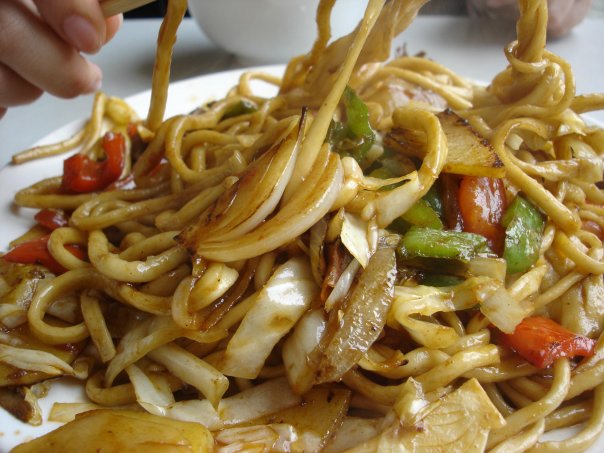
Lamb in Pitta 羊肉夹馍
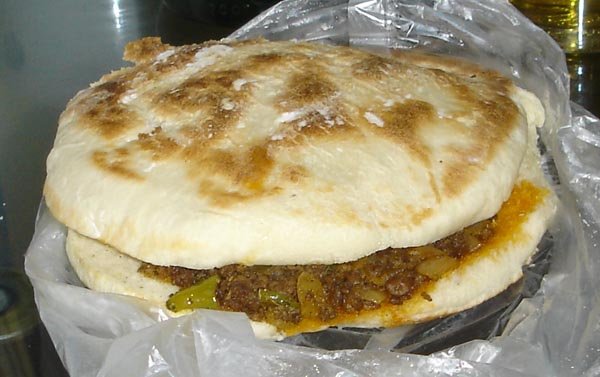
Xinjiang Da Pan Ji (Big Plate Chicken) (新疆大盘鸡)
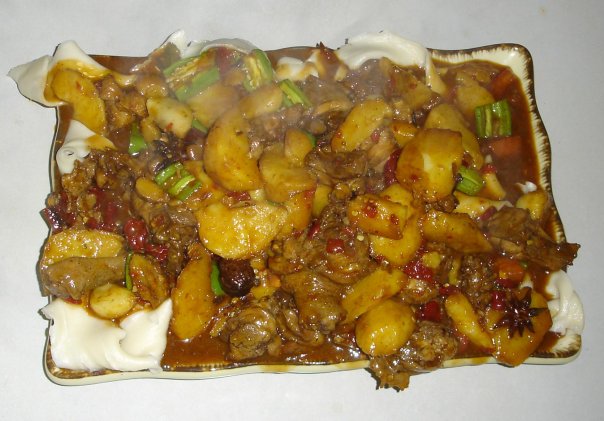
-
Black or white peppercorns are nothing like Sichuan Peppercorns (which are not peppers at all!). Definitely not a substitute.
Also, Five Spice Powder doesn't necessarily contain five spices. Numbers in Chinese can have a non-literal meaning. Here it just means around five.
Is it common practice in China to mix this up yourself, or do most people use a commercial blend?The latter. Not that people actually use it very much.
Centuries ago, when I was a young man, I worked in London’s Leicester Square. My office backed onto Chinatown and, every day, by 10 am I would be dribbling and frothing and salivating at the smells emanating from the back windows of the restaurants.
Now, I’m not saying that the restaurants in London’s Chinatown are good. A few are. Most are execrable. But they sure know how to lay on a smell.
So, when I first came to China, I expected to find the same smell. No! Zilch! China smells nothing like Chinatown.
Then I went to Hong Kong for the first time. Before we pretended to hand it back! That smells like Chinatown.
So, then I started to think about the source of the smell. What is it? After many sniffings, I decided it’s Five Spice Powder. It seems to be more popular there than anywhere else. Of course, it originates in Sichuan, but even there isn’t used that much.
The individual ingredients, Sichuan Peppercorns, Cassia bark, Fennel, Star Anise, Cloves etc are used much more often on their own – particularly to flavour hot pots in winter.
I just did a quick and highly unscientific poll of all my Chinese friends who happen to be online. 13 of them. Only one could find Five Spice Powder in her kitchen. And she is from Hong Kong! Said it has been there for years.
My local convenience store doesn’t carry it, but it is sometimes available in the larger supermarkets.
I’m told that it occasionally bought for certain festivals, but not for every day use. I can’t find anyone who makes it themselves.
-
In what way are Taiwanese sausage different to lap cheong?
They are much sweeter.
-
I've had Hot and Sour soup in Sichuan more times than I care to count. Never had one with Hot Bean Paste.
White pepper every time.
-
It's probably in Sichuan and/or Hunan where freshness is of lesser concern (correct me if I'm wrong)
I'd say "wrong".
Freshness seems to be important everywhere. I lived in Hunan for a few years and a trip to the market was an education in how to buy fresh. Hundreds of housewives berating the rogue behind the stall who was allegedy attempting to sell them vegetables picked two hours ago rather than one. Same in Sichuan, Yunnan, Guangxi...
-
White pepper every time.



Zhuang Preserved Lemons / Lemon Duck
in China: Cooking & Baking
Posted
酸柠檬 (酸檸檬)